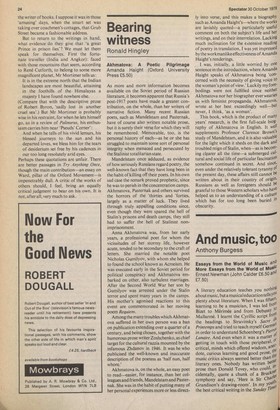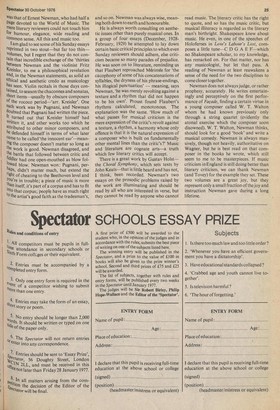And music, too
Anthony Burgess
Essays from the World of Music and More Essays from the World of Music, Ernest Newman (John Calder £6.50 anu £7.50) A literary education teaches you nothing about music, but a musical education tells )4:41 plenty about literature. When I was fifteen, learning to be a musician, I was led frog.' Bizet to Merimee and from DebussY t° Mallarme. I learnt the Cyrillic script fronl the headings to Stravinsky's Sacre 4111 Printemps and tried to teach myself Gerrlati, in order to understand Schoenberg's Pierl Lunaire. And even when it was a matter 49 getting in touch with those peripheral, °r critical, minds which offered wisdom, alle,e, dote, curious learning and good prose, music critics always seemed better than tb, tel,
literary ones. Nobody has written be
prose than Donald Tovey, who could, Itic cidentally, quote a chunk of a Bruck symphony and say, 'Here is Sir Charlesti Grandison's drawing-room'. In my Youtg; the best critical writing in the Sunday Tinl`
was that of Ernest Newman, who had half a Page devoted to the World of Music. The mere literary reviewers could not touch him for humour, elegance, wide reading and Common sense. All this and music too.
lam glad to see some of his Sunday essays reprinted in two stout—but far too thin— volumes, but I regret that they do not contain that incredible exchange of the 'thirties between Newman and the violinist Fritz Kreisler, to me a philosophical revelation and, in the Newman statements, as solid an ethical and aesthetic credo as musicology has seen. Violin recitals in those days contained, to season the chaconnes and sonatas, Short items—usually by obscure composers of the rococo period—`arr. Kreisler'. One such work was by Pugnani, and Newman doubted that Pugnani had written the piece. It turned out that Kreisler himself had written it, and other works too which he attributed to other minor composers, and he defended himself in terms of what later came to be called 'the innocent ear'—meaning the composer doesn't matter so long as the work is good. Newman disagreed, and the battle that followed between critic and fiddler had one open-mouthed as blow followed blow. Newman won: Pugnani, per"PS, didn't matter much, but extend the night of cheating to the Beethoven level and You're in trouble; a piece of music is more 1,han itself, it's part of a corpus and has to fit 'to that corpus; People have as much right to the artist's good faith as the tradesman's, and so on. Newman was always wise, meaning both down to earth and honourable.
He is always worth consulting on aesthetic issues other than purely musical ones. In a group of four essays (December, 1928February, 1929) he attempted to lay down certain basic critical principles to which even Sunday reviewers should adhere, else criticism became so many parades of prejudice. He was soon on to literature, reminding us that Flaubert reproached Merimie for 'the cacophony of some of his concatenations of syllables, the dryness of his phrase-endings, his illogical punctuation' — meaning, says Newman, 'he was merely revolting against a texture and a rhythm that did not happen to be his own'. Proust found Flaubert's rhythms calculated, monotonous. The explanation was the same. 'How much of what passes for musical criticism is the mere expression of the critic's revolt against a texture, a rhythm, a harmony whose only offence is that it is the natural expression of a composer who is built on fundamentally other mental lines than the critic's?' Music and literature are cognate arts—a truth which few literary critics will accept.
There is a great work by Gustav Hoist— the Choral Symphony, which sets texts by John Keats—that is little heard and has not, I think, been recorded. Newman's two essays on the prosodic problems raised by the work are illuminating and should be read by all who are interested in verse, but they cannot be read by anyone who cannot read music. The literary critic has the right to quote, and so has the music critic, but musical illiteracy is regarded as the literary man's birthright. Shakespeare knew about music. He even, in one of the speeches of Holofernes in Love's Labour's Lost, composes a little tune—C DGAE F—which no Shakespeare scholar, to my knowledge, has remarked on. For that matter, nor has any musicologist, but let that pass. A reading of Newman at least reawakens a sense of the need for the two disciplines to come closer together.
Newman does not always judge, or rather prophesy, accurately. He writes entertainingly and perceptively on the first performance of Facade, finding a certain virtue in a young composer called W. T. Walton whom he had known previously only through a string quartet (evidently the atonal exercise which the composer soon disowned). W. T. Walton, Newman thinks, should look for a good 'book' and write a musical comedy. Newman is always massively, though not heavily, authoritative on Wagner, but he is best read on that composer in the books he wrote, which still seem to me to be masterpieces. If music criticism in England is still doing better than literary criticism, we can thank Newman (and Tovey) for the example they set. These two volumes are a great joy, but they represent only a small fraction of the joy and instruction Newman gave during a long lifetime.



































 Previous page
Previous page